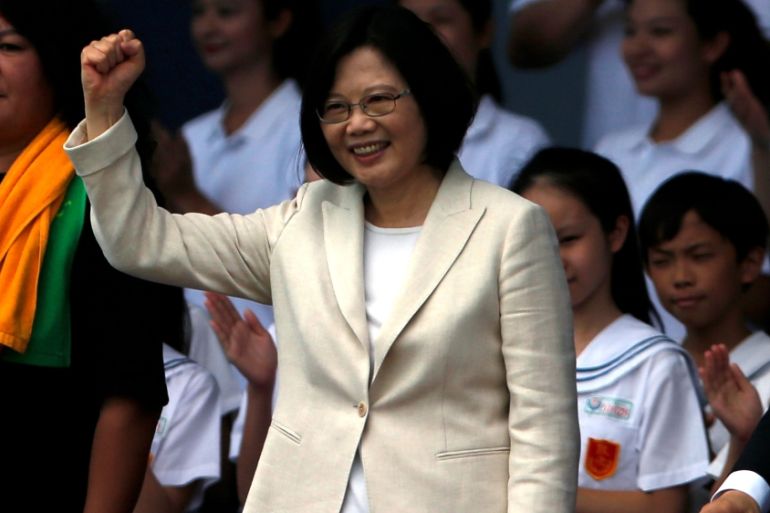Tsai Ing-wen becomes Taiwan’s first female president
New president calls for Taipei and Beijing to “set aside the baggage of history” in her inaugural address.

Tsai Ing-wen has been sworn in as the new president of Taiwan, becoming the country’s first female leader as she called for Taipei and Beijing to “set aside the baggage of history”.
While Tsai called for “positive dialogue” with China, her soft approach was not reciprocated by Chinese authorities, who said regardless of what internal changes take place within Taiwan, “China will oppose Taiwanese independence.”
Keep reading
list of 4 itemsChad’s Mahamat Deby confirmed as winner of disputed presidential election
Why are protests against France raging in New Caledonia?
South Africa’s Ramaphosa signs health bill weeks before election
Tsai’s Democratic Progressive Party (DPP) won parliamentary and presidential elections by a landslide in January on a voter backlash against creeping dependence on China.
The DPP, which has traditionally favoured independence from China, takes over after eight years under China-friendly Nationalist Ma Ying-jeou.
|
|
| Taiwan’s first female president takes the helm |
The new president did not mention the One-China policy in her televised inaugural address on Friday in a move likely to anger Beijing, which claims the self-governing island as its own territory.
Tsai said in her speech that she respected the “joint acknowledgements and understandings” reached between the sides at a landmark 1992 meeting seen by China as underpinning all subsequent contacts and agreements.
However, Tsai made no explicit mention of the concept that Taiwan is a part of China, which Beijing says is crucial to the entire relationship.
Tsai called for Taipei and Beijing to “set aside the baggage of history, and engage in positive dialogue, for the benefit of the people on both sides”.
READ MORE: Can democracy work in a Chinese culture?
“Cross-Strait relations have become an integral part of building regional peace and collective security,” Tsai said. “We will work to maintain peace and stability in cross-Strait relations.”
“She took a cautious path today,” said Al Jazeera’s Adrian Brown, reporting from the Taiwanese capital Taipei.
“She didn’t say exactly what China wanted her to say, but she also didn’t say enough to really cause China to froth at the mouth.”
Biggest menace
China’s Taiwan Affairs Office said Tsai’s remarks were an “incomplete answer”, warning that China saw any push for Taiwan’s independence as “the biggest menace to peace across the Taiwan Strait”, according to the official Xinhua news agency.
Chinese Foreign Ministry spokeswoman Hua Chunying, asked about the inauguration, merely praised the record of the “one China” policy.
“Regardless of what internal changes take place within Taiwan, China will uphold the one China principle and oppose Taiwanese independence,” she told a briefing.

China maintains that Taiwan must unify with the mainland eventually, by force if necessary. However, Taiwanese public opinion is strongly against any sort of political union or outright conflict between the two sides, instead favouring the status of de facto independence and robust social and economic interactions.
“Many people who voted for Tsai Ing-wen in January’s election did so because they want her to preserve Taiwan’s distinct identity. There are others, of course, who want independence, but mostly here in Taiwan, people want to stick to the status quo,” said Brown.
“They don’t want conflict with China.”
Focus on domestic issues
While her comments on the future of Taiwan’s relations with the mainland grabbed the world’s attention, domestic issues were at the core of Tsai’s inaugural address.
Taiwan has been suffering an economic slide in the recent years. The growth rate of the island nation’s economy is less than one percent.
“Most of her speech focused on domestic issues,” Al Jazeera’s Brown said. “The economy, jobs, the fact that they have to overhaul the pension scheme in this country, mundane issues to people outside Taiwan, but here in this country they are very important.”
But Taiwan’s economy is also dependent on the mainland.
“Almost 50 percent of Taiwan’s exports go to China,” Brown said. “The new president wants to explore the possibility of developing stronger trade ties with countries in southeast Asia.”
|
|
| China warns Taiwan after landslide election victory |